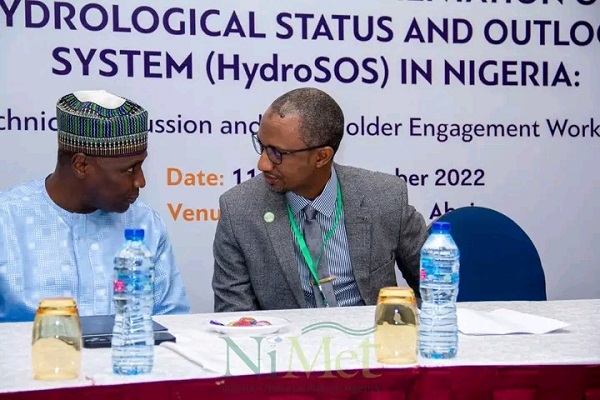
The Nigerian Meteorological Agency (NiMet) said it has entered into a collaboration with the UK Center for Ecology and Hydrology (UKCEH) and the Nigeria Hydrological Services Agency (NiHSA) to implement the World Meteorological Organisation’s (WMO) 2022 Hydrological Status and Outlook System (HydroSOS).
The three-day event held in Abuja, Nigeria, is an initiative by WMO to address water-related challenges crippling the sustainable development of the WMO member countries. The participants comprise stakeholders from various sectors of the nation.
In his opening remarks, the WMO representative for North, Central and West Africa, Dr. Bernard Gomez who represented the secretary-general of WMO, Prof. Petteri Taalas, stated that the HydroSOS will assist the hydrological and meteorological community to provide vital information about water resources for stakeholders across all sectors while improving the country’s adaptation to climate change.
The deficiency of information can be linked to insufficient local-scale data, a lack of regional-to-global coherence in hydrological information and modelling systems and limited dialogue between the multitude of actors, which renders the understanding of stakeholders’ water management needs unclear.
The Minister of Aviation, Sen. Hadi Sirika, represented by the rector, Nigerian College of Aviation Technology (NCAT) Zaria, Capt. Abdulsalam Mohammed disclosed that the WMO HydroSOS project will address the insufficient local-scale data and incoherence in regional to global hydrological information and modelling systems, limiting dialogue between the multitude of actors leading to the unavailability of water resources on spatio-temporal scales, thus the HyroSOS is a laudable effort by the WMO and commends UKCEH, NiMet and NiHSA for embracing the implementation of this project in Nigeria.
“This workshop is timely, as it intends to address and proffer solutions to global challenges associated with hydro-meteorological hazards (risks), especially as it relates to Africa and Nigeria particularly.
“Over the years, the management and distribution of water resources, as well as mitigation of water-related hazards and disasters, have been challenging for government at all levels, globally. Sometimes, this may be attributed to a deficiency of hydrometeorological information during planning in times past exacerbated by the impacts of changing climate.
“The deficiency of information can be linked to insufficient local-scale data, a lack of regional to global coherence in hydrological information and modelling systems and limited dialogue between the multitude of actors, which renders the understanding of stakeholders’ water management needs unclear.
“As a result of these shortfalls, water managers and stakeholders cannot properly assess the availability of water resources on different spatio-temporal scales. Thus, the need to have hydrological information and products that are impact-based, demand-driven and users specific,” he said.
Appreciating the WMO for developing the HydroSOS project in Nigeria, the director-general of NiMet, Prof. Mansur Bako Matazu expressed his gratitude to the WMO and revealed that water-related hazards and threats such as securing water supplies, designing appropriate water governance schematics, sustaining the management of trans-boundary basins and managing flood/drought are some of the major challenges faced by the Nigerian government.
“It is no longer news to anyone here that water-related hazards and threats have become a global challenge in the face of a changing climate coupled with population growth and increasing socio-economic activities.
“Every year, water-related hazard affects millions of people globally and causes damage to properties worth billions of dollars. It is expected that water-associated risks are going to intensify in the coming years, as the full weight of climate change begins to bear on our earth.
“In Africa, water-related hazards such as flood and drought have become a major cause of food insecurity, strains on livelihoods, health risks and conflicts in many parts of the continent.
“Water-related challenges which face governments at all levels include securing water supplies, designing appropriate water governance schematics, sustaining the management of transboundary basins, managing flood and/or drought, as well as ensuring the protection and conservation of our ecosystem.”
Matazu recalled a forecast issued in February and followed up by the monthly updates that “we are going to have above-normal rainfall in most parts of the country”.
He further added: “From the information we are getting, we are going to see more flood[ing] and now the rains are concentrating on the north-central and the southern states. That will be a combination of short-duration, high-intensity rain, with riverine flooding. We are going to see more of these floods in the north-central states as we have seen in Kogi, south-eastern and south-western states as we are beginning to see in Anambra and some parts of the southwest”.
Matazu stressed that one of the major factors in addressing these challenges is designing and availing hydro-meteorological information and products targeted to serve the need of different sectors, hence implementing the HydroSOS project is critical in tackling these challenges.
At the end of the programme, stakeholders are expected to devise strategies to aid in mitigating water-related hazards such as flooding.

